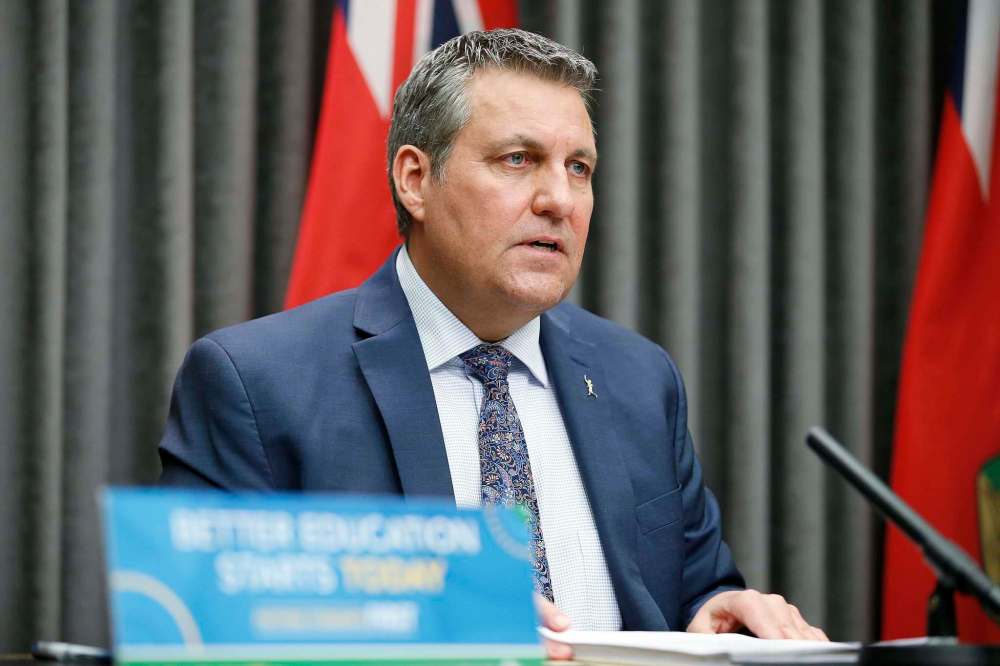Manitoba education reform bill built on ‘false, divisive premises’: former administrators
Advertisement
Read this article for free:
or
Already have an account? Log in here »
To continue reading, please subscribe:
Monthly Digital Subscription
$1 per week for 24 weeks*
- Enjoy unlimited reading on winnipegfreepress.com
- Read the E-Edition, our digital replica newspaper
- Access News Break, our award-winning app
- Play interactive puzzles
*Billed as $4 plus GST every four weeks. Offer only available to new and qualified returning subscribers. Cancel any time.
Read unlimited articles for free today:
or
Already have an account? Log in here »
Hey there, time traveller!
This article was published 03/05/2021 (1401 days ago), so information in it may no longer be current.
Thirty retired superintendents have signed an open letter against Bill 64, in the hopes of halting the province’s sweeping reforms to K-12 education.
The collective of former Manitoba educators, who have worked in all corners of the province, argues the Education Modernization Act will lead to the politicization of public education and harm the collaborative culture in and among schools.
The legislation, which the province unveiled March 15, alongside the education review and a plan to act on its recommendations, aims to replace English school boards with a centralized authority run by government appointees.

The province claims the changes will boost student outcomes and amplify parent voices through new school councils.
“Bill 64 is based on false and divisive premises and promises — of quality (test scores vs. poverty); participation (individual parents vs. school boards); collegiality and professionalism (principals vs. teachers); and, efficiency (extreme centralization vs. local discretion),” states the superintendents’ letter, which was sent to provincial officials and education stakeholders.
Coralie Bryant, co-author and signatory, takes issue with plans to eliminate paid, elected trustee positions and hand off some of their current roles, such as budget planning, to volunteer parents. Many caregivers do not have time to engage with existing parent councils, let alone revamped ones with robust responsibilities, said the retired superintendent of Seven Oaks School Division.
“The current government does not have our permission to do this. They didn’t mention it in the election of 2019,” said Ken Klassen, a former superintendent in the Hanover School Division, adding he fears the new set up could see any government appoint partisan directors of education.
Among the group’s concerns: the removal of principals from the teachers union, how all students will be represented (particularly in Winnipeg, if the capital is home to only one region), and the impact child poverty continues to have on Manitoba’s lagging test scores.
In a prepared statement, Education Minister Cliff Cullen said the province has asked educational leaders to put their names forward for new task forces and advisory panels to shape the new system.
Cullen added: “We all share the same common goal and that is to ensure student success is the top priority, so we welcome their input on our engagement, task forces and advisory panels.”
maggie.macintosh@freepress.mb.ca
Twitter: @macintoshmaggie

Maggie Macintosh
Reporter
Maggie Macintosh reports on education for the Winnipeg Free Press. Funding for the Free Press education reporter comes from the Government of Canada through the Local Journalism Initiative.
Our newsroom depends on a growing audience of readers to power our journalism. If you are not a paid reader, please consider becoming a subscriber.
Our newsroom depends on its audience of readers to power our journalism. Thank you for your support.


